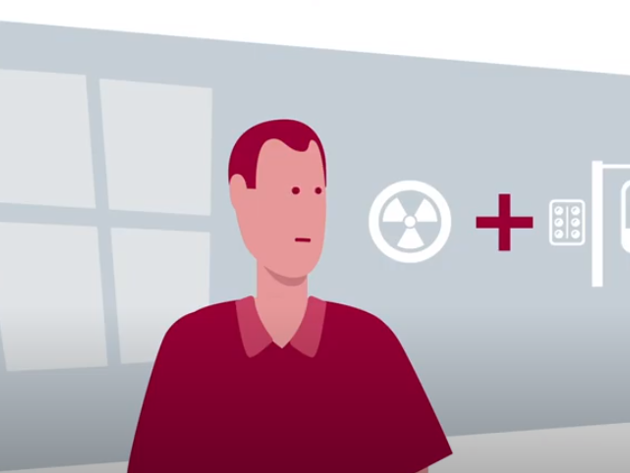Chemoradiation
What is chemoradiation?
Chemoradiation is a treatment combining chemotherapy and radiotherapy. Chemotherapy makes cancer cells more sensitive to radiation. During treatment with chemotherapy, we administer a substance that kills cancer cells or halts cell division. This substance is called a cytostatic. This cytostatic gets into the bloodstream and spreads through the body. During radiotherapy treatment, cancer cells are destroyed with x-radiation or gamma radiation. The radiation is delivered externally to the tumor and/or metastases.
This type of treatment can be used for tumors in the head and neck region, lung cancer, colon cancer, rectal cancer, anal cancer, esophageal cancer, stomach cancer, and cervical cancer.
What to expect?
Before your chemoradiation treatment, you will meet with your practicing physician to discuss practical concerns about the treatment and any questions you may have. You may have a consultation with a dietitian afterward. You will have a CT scan to prepare you for your radiation treatment so we can determine the exact radiation field. You may need to come in for additional diagnostic procedures like a blood test. On the first day of your radiotherapy, please register at the Radiation Oncology Department. A radiation therapist will take you to a dressing room and guide you to the radiation room. Please make sure that you do not move during the treatment. The radiation treatment will take about 15 minutes.
You will receive chemotherapy alongside your radiation treatment. Depending on your tumor type, you will have the chemotherapy at home in tablet form, as an IV at the hospital, or a combination of the two. Chemotherapy will make the cancer cells more sensitive to radiation.
What are the side effects?
Side effects of chemotherapy
It can be hard to predict which exact side effects you will experience. These will depend on the type of chemotherapy you are receiving and your sensitivity to the substance. You may experience fatigue, nausea, vomiting, or hair loss. You may develop an infection, anemia, nose bleeds, or small bleeding on the skin. Of course, we will try to make the chemotherapy as comfortable as possible for you.
Chemotherapy may affect your fertility. We offer the opportunity to freeze sperm, egg cells, or embryos before your treatment. Your physician will discuss your options with you.
Side effects radiotherapy
The exact side effects you will experience are hard to predict. These depend on the area receiving the radiation, the radiation dose, and your sensitivity to the side effects. During and after your treatment you may experience fatigue and the skin receiving the dose may be read. Of course, we will try to make the radiotherapy as comfortable as possible for you.
 nl
nl
